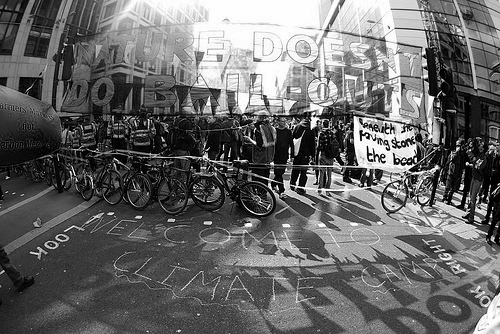Voting: The Single Most and Least Important Thing Youth Can Do
Voting: The Single Most and Least Important Thing Youth Can Do

I wish that I could say that I was surprised that the national leaders debate completely ignored our generation, but I can’t.
The thing is, now that the initial seething has subsided, I can’t decide if I actually even care any more. Now don’t get me wrong. I think it is absolutely shameful and embarrassing that the generation that will inherit a grab-bag of crises caused by those currently in power, is ignored. On the other hand, this reinforces my belief that the solutions we need will never come from the top down, and will not be won at the ballot box.
Stopping the worst impacts of climate change, and building a better, more just planet in the process, requires us to break the mould of our current systems of production and consumption. Simply put, those programs considered feasible by the political system are not compatible with the world we need. We need to stop changing the climate, and start changing the politics.
Across this country youth are sick and tired of being offered what amounts to little more than a selection of the least of a number of evils, knowing that any selection is still evil. We are tired of a perversion of democracy where the powerful offer us their short-sighted version of what is an ego soaked vision of their Canada. This country, and this planet, does not belong to the political class, but to its people.
What we really need is a system which respects the idea of mandar obedeciendo, the Zapatista principle of a leadership of obedience. This basic tenement of all democracy posits that a leader must take his guidance from the people through a wide ranging, inclusive process of listening and understanding what they need. In a campaign where youth have been barred from campaign rallies and in a country where the voices of those people most affected by the negative end of government policy – indigenous peoples, people of colour, working people, migrants, poor people, women, queer and trans folk and other marginalized communities – are seldom heard in the corridors of power, this principle is far from practice.
So how do we change that?
We need to reclaim power.
Across the country youth seem to be coming out from the woodwork, showing up by the hundreds to pledge their vote in this election. It makes sense. In an economic and political system that takes away our power voting make us feel that for fleeting moments we actually hold power. Elections, in many ways, have become a ritual in which we are granted a feeling of empowerment, to be stripped from us the moment the final polls close. The problem is that unlike the commonly held belief that democracy ends in the ballot box, that is really just the begining.
In the words of the late Howard Zinn: “Historically, government, whether in the hands of Republicans or Democrats, conservatives or liberals, has failed its responsibilities, until forced to by direct action: sit-ins and Freedom Rides for the rights of black people, strikes and boycotts for the rights of workers, mutinies and desertions of soldiers in order to stop a war. Voting is easy and marginally useful, but it is a poor substitute for democracy, which requires direct action by concerned citizens.”
So sure, get out the vote and feel good about it, but hold on to that feeling because the fight really starts on May 3rd.
Cameron Fenton is the National Director of the Canadian Youth Climate Coalition

